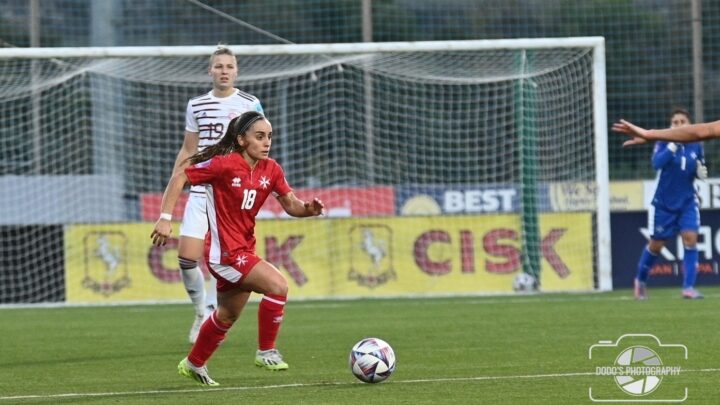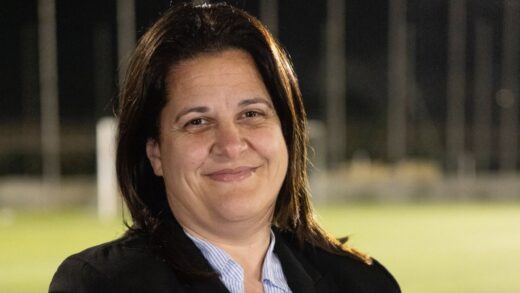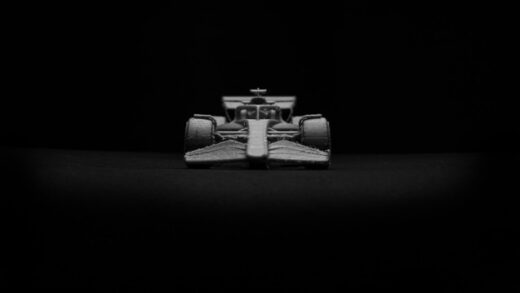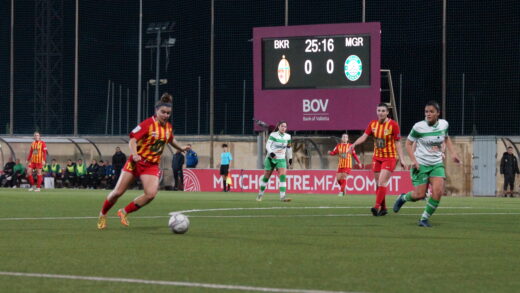Hailing from Malta’s sister island of Gozo, Emma Xuereb has grown into one of Malta’s most influential sporting figures. Although most readers of The Sporting Fan will know Emma Xuereb’s footballing exploits, she also gives plenty to the CrossFit community, while also involved in Motocross, among other sport.
Having captured domestic titles for more than a decade and being one of the key figures to secure promotion with Malta’s National Women’s Team last December, Xuereb explained her evolution as a player throughout the years and the changing football scene. Most recently becoming the first Maltese female footballer to be announced as a semi-professional in local football by Swieqi United, Xuereb also discussed the nuances of this step and the investment needed to go to the next level.
Often hailed as one of the most positive players in the women’s football sector, Xuereb was also candid on the season-ending injury that sent her world crashing from the highs of promotion with the national team last December and what it took to get back into it. As a professional physiotherapist, with special interest in sports rehabilitation, Xuereb also provided a unique viewpoint of the importance of this role in the sport.
Beginnings
Eleanor Saliba (ES): Walk me through your beginnings in football in Gozo…
Emma Xuereb (EX): I remember going to school as early as possible and dragging my best friend with me to play football so I would not be alone with the guys, only to then realise she usually vanished half way through to go play netball or something else! Until I scored the first goal, the boys gave me some trouble, but then with time they welcomed me into the group.
I also used to go watch my brothers train and play football, but never really joining the team. Then I was playing basketball with a girls team and at one point we all shifted to create a football team. A couple of my mates decided to speak with a football club president to create like a Gozo league and it kicked on from there. The team was S.K. Victoria Wanderers, who have recently re-emerged in Malta’s women’s leagues as well. Additionally, we had like a Gozo ‘national team’ selection and then I remember the national team coach of Malta at the time, Pierre Brincat, came to watch us play and I earned my first call-up at sixteen. So, there was a time where I was training with three teams.
ES: Since then, you’ve had plenty of success with Mosta, Hibernians and even Swieqi. Considering your changes also in position on the pitch, what do you think are the crucial elements that have allowed you to adapt and achieve success with teams on the pitch?
EX: I think the shift from Gozo into the Maltese clubs was a necessity once I came to study in Malta. So, I joined Mosta, then there was some time with Gozo and Luxol, before moving to Hibernians. When assessing a move I am always looking to play with players who are going to challenge me so that I can keep growing. I think throughout, I’ve always seen the women’s game improve. We started from just having a coach, maybe an assistant coach, but today we are seeing much better staff setups with also physical preparators, kit managers, sometimes even nutritionists.
It was not always easy, but I think I’ve been lucky to be able to move into teams that were always a step better. You must always fight for your place and initially it is always tough when you move into a team, but I think I’ve always had a positive environment around me when it comes to players. So, players like Dorianne Theuma, who was always inspirational, were important to grow. I remember her always saying “you play how you train”.
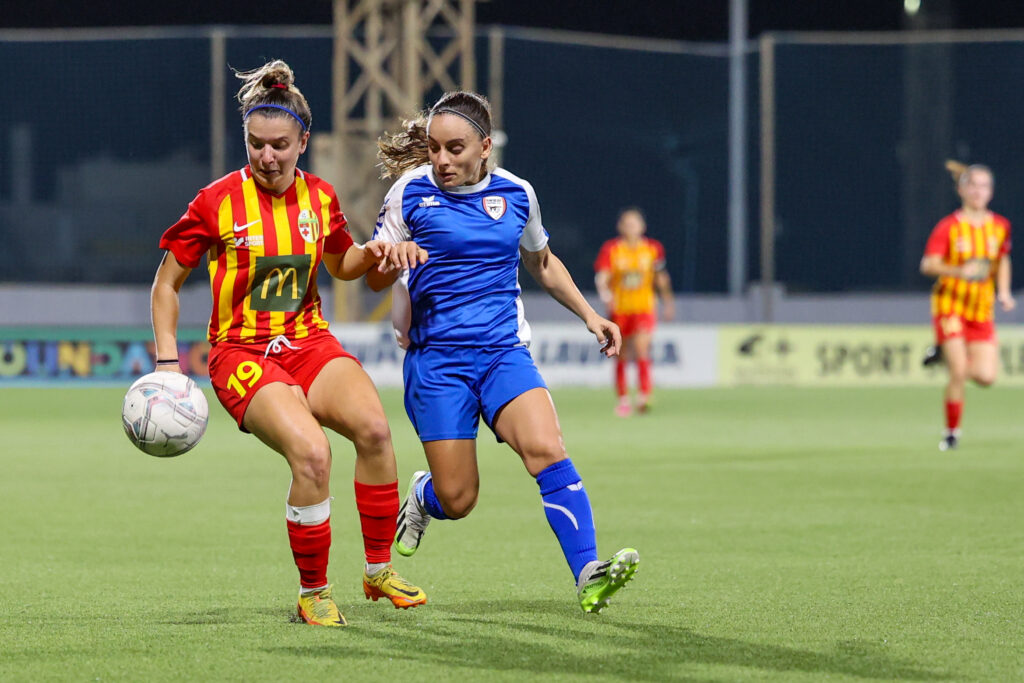
ES: You’ve also evolved as a player in positions. How did you adapt and what was your reaction when coaches started to shift your position?
EX: I started out as a striker and then over time I started to play on the wings. As a player I was always looking to adapt. I was always listening to what the coaches instructed, not just to me, but also to other players who were playing in different positions. That was important so that then I could understand the movements of other players on the pitch and combine the complete football puzzle so to speak.
There were matches where I played even three positions in one match. There was a particular coach at Mosta who gave me a free-role. To be honest it was a bit too free for me, so that was a bit confusing at time. However, you learn as well.
Now I’m more of a full-back and I feel that I’ve changed as a player. As a young player I was obsessed with running behind and placing the ball as a striker, but over time the game also changed and is now less direct. I was never the most technical, my strength was always my speed. With time I’ve shifted into a full-back and I’ve adapted to it. My mindset has shifted into a more defensive one, I’m now more looking to protect defensively, while still looking to use my pace to get forward and support the attack. The fact that I also played as a striker and a winger helps to understand their movements as well.
The Highest Of Highs & The Lowest Of Lows
ES: Looking back on the UEFA Women’s Nations League (UWNL), you had a particularly crucial job with several countries having strong wingers. What was that like for you in terms of the challenge of the match itself, but also the pressures of promotion?
EX: The coaching staff did a brilliant job to prepare us with the right material and then as a player you must do your bit to study your role and the opponent in the match. For example, Claudia Chiper has unbelievable speed so that was really tough to break during the match against Moldova. Olga Sevcova is another brilliant player and a crucial creator for Latvia, so she was another challenge to play against.
However, the coaches did a really good job in preparing us mentally ahead of the matches, especially in the do-or-die match against Latvia. This, especially considering that we did not get the job done against Moldova, where it felt like maybe the pressure got to us. That mental preparation for the final match was a very important piece of securing the promotion and they truly did a great job. Pressure is good in the sense that it pushes you to go further, but you have to have the tools to handle it.
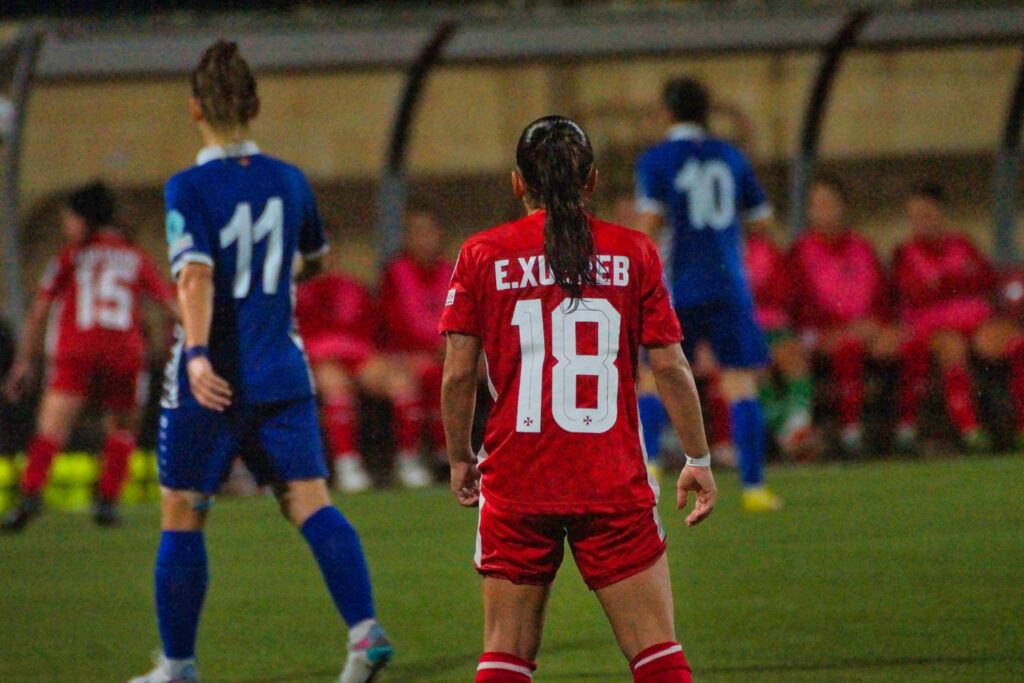
ES: Injury plagued the latter half of the season for you. How did you process this, especially after the triumph of promotion in the UEFA Women’s Nations League (UWNL) with the Malta Women’s National Team in December?
EX: I think last season was one of the biggest rollercoasters in my life. I was already feeling pain in my ankle during the last two matches of the UWNL against Moldova and Latvia. However, I soldiered through and as you can imagine, that moment of promotion was the peak of emotions.
Then, we continued the league and my ankle gave way shortly after. So, I only played around twenty minutes in December with Swieqi and was in pain all the time. I had to operate on the 20th December. So within the span of around fifteen days I went from playing at the highest level and celebrating promotion, to sitting on the couch with my foot up, needing support to walk, cannot go to work, cannot train. It was a shock and mentally it was the worst feeling ever.
So, I think today with hindsight I realise that the injury affects you not only because it stops you from playing the game, but also affects you because automatically you get detached from the team. I think maybe I could have done more from my side, but I was so mentally distraught that I couldn’t bring myself to be there with the team. I tried going to watch them train but often as I returned to work, I started using it as a distraction and going straight home. I did not want to see a football or people related to it, so mentally I hit a very low point.
Luckily, I was surrounded with the right people and my teammates always encouraged me, this was crucial to get myself out of that. I returned to the gym and this meant that I surrounded myself with people who were training and I was doing whatever I could to train, maybe doing upper body or something else not to exacerbate the injury. In the meantime, I was going to the physio for my ankle and as a physio you’re the worst patient.
There was some false hope in how quickly I could return, so that was another hit and when I returned initially, I was still in pain when I shouldn’t have been. I jumped for a ball the night before the opening match against Northern Ireland (in April), twisted my ankle and then a hit a new low.
At that point, I started doubting whether I’d be the same player ever again and if I would recover. I was thinking of stopping football completely. Again, luckily the national team coach (Manuela Tesse) and the physios were encouraging me to still attend training and work with the physio. So, I went every day. It was not easy and sometimes I had to force myself, but then once there, they really supported me. We tried a different treatment and I was just focusing on getting better day by day. I’ve been training fully for a month now and physically I feel much better thanks to the staff, including the physical preparator (Karl Attard).
So, today I understand the importance of that support structure and surrounding yourself with the right people. The effects of an injury are not only physical. Having that support was crucial in being able to return and go through the motions.
Life As A Physio
ES: Besides playing football (among practicing other sport), you are also a qualified physio. Can you define the role of the physio in football and what made this an interesting path for you?
EX: I am a physiotherapist by profession. The role in football is to take care of injured players, so you first take care of the injury, then rehabilitate them and then work with the physical preparator to get them as fit as they were before to play the game. Physios also have a role to play before a match, maybe strapping players due to old injuries or niggles.
Having been involved in sport since a young age meant that I was always fascinated by the human body, the mechanism of injuries and how they happen. So, I felt it’s a right fit for me to become a physio and work in an environment that combines the two. It also helps me as an athlete to know my body, know what to expect and how to take care of myself to strive for improvement.
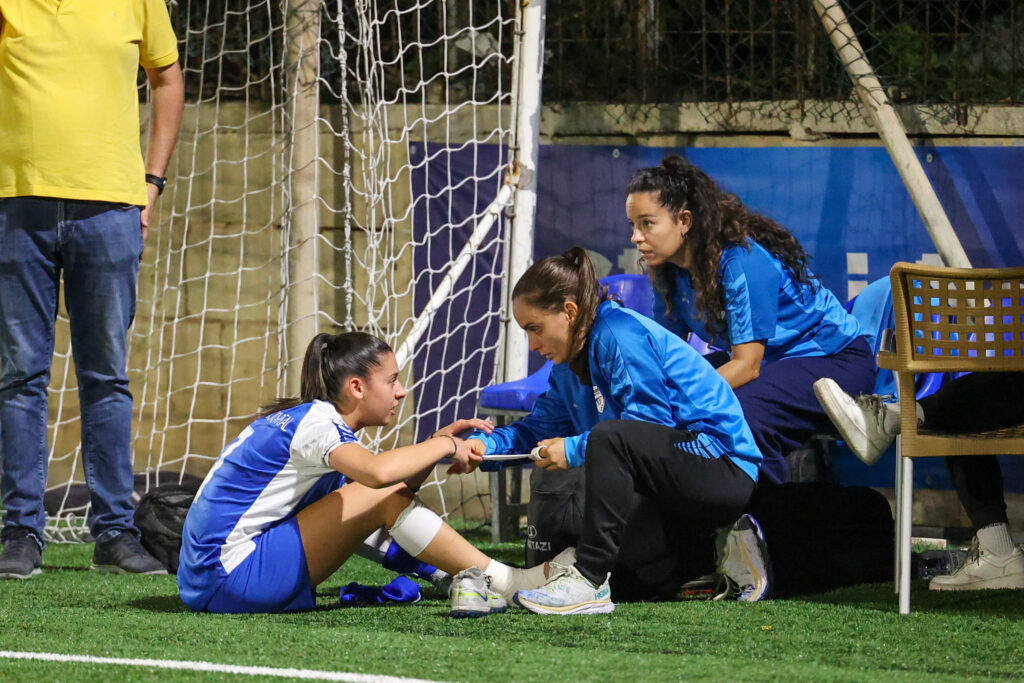
ES: What is the relevance of having a physio with the team as opposed to having the support of a general first-aider?
EX: From my experience, being with my team, knowing the players well and all the history of injuries as well as their character, helps me to do my job a lot better. You build a relationship and trust with a player, which is very important.
As someone who has been on both sides of it, both as a player and as a physio, I know that if that trust is missing then the process is not comfortable. As a player you want to trust that your physio is doing the right things, while as a physio you want to be sure that your player is following your guidance.
The same thing applies also with the tactical coach because as a physio you need that open communication to guide them on how many minutes a player can take, and ultimately that affects their game plan.
All of this comes together during the match, where you’re the first person assessing an injured player. Knowing the character of a player is important to assess the severity, while also having the full historical picture of what the player is going through gives further context. So, yes having a physio dedicated to a team is crucial.
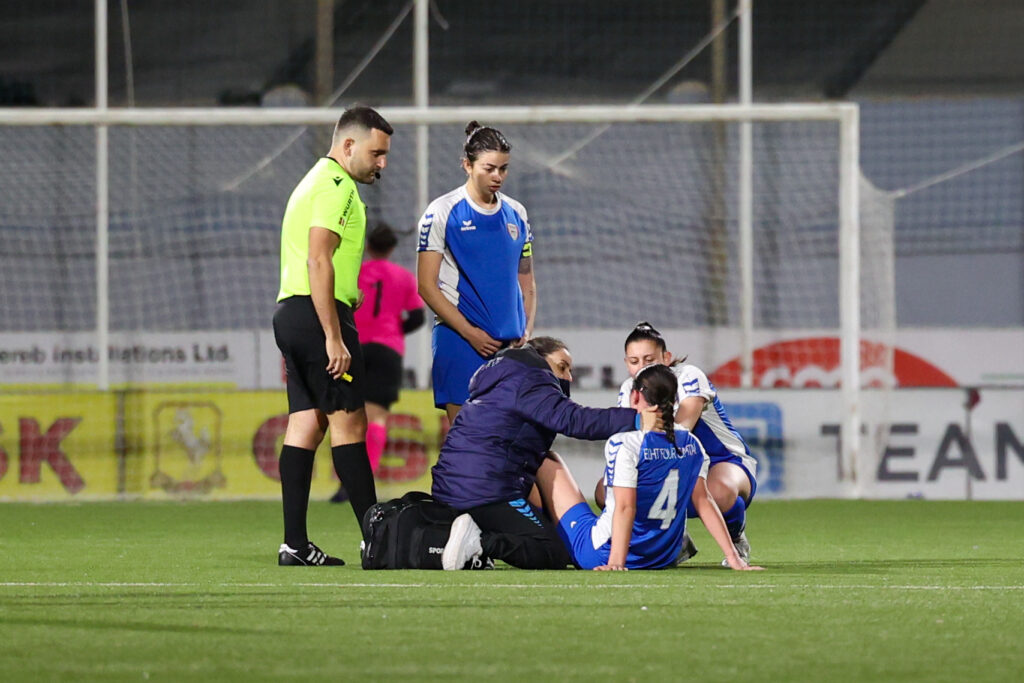
ES: What more can be done to equip physios to be able to give players better care?
EX: Luckily, the Malta FA (MFA) is already offering MFA physios a trauma course which prepares us in the event of emergencies during matches, to know exactly what we need to do as a first aid. This education is important, but it has to be recurring.
The initiative also has to come from the physio as well. There are a lot of conferences discussing ongoing research. For example, recently I had the opportunity to attend a conference organized by FIFA in Lyon, where you listen to researchers discussing different aspects related to injuries specific to football. There’s also the FIFA Diploma in Football Medicine, which is another option. So, I think pushing yourself to always learn more is important.
Clubs must then utilise the physio in the best possible way. Having a physio dedicated to the team is beneficial. The ideal scenario would be to have the physio in all training sessions, but of course you have to factor in costs. However, to at least get to the point of having a physio on the bench for all matches, and for players to have a dedicated physio that players can talk to on an appointment basis, who liaises with the one attending matches, would already be an important step.
Growth & Professionalization in Football
ES: You were the first player announced to be given a semi-pro contract, which is a first in Malta for a Maltese (Gozitan) player. Looking back did it ever cross your mind that it could get to this?
EX: I think there was always a dream of being a professional footballer, but at the same time there were so little opportunities that I think it always felt like a remote or obscure dream. The first player who showed us it is possible to be a professional player was Rachel Cuschieri.
It’s like our mentality growing up was always that you would study and get a job to sustain yourself, while having football on the side. The possibility of having football be the central thing that sustained you was remote. Today, there are a lot more opportunities. Were I a young player today, my priorities would be different and I would certainly push more to be employed as a professional footballer.
However, Swieqi United have made this step toward a semi-professional team and it is credit to Justin (president Dr. Justin Fenech) who made the promise and stuck to his vision and word. He’s a great leader, someone you feel comfortable speaking to and someone who has always kept women’s football on an equal level to the men’s. We were always supported in the way that you feel you should be. So, putting everything together, it was an easy decision to sign this contract because I knew it’s a club that really pushes to grow not just the club and us as players, but one that strives to do it in the right way and with the intention of pushing the sport forward.
ES: Now that you’ve gotten several years under your belt in the women’s game, at both club and international level, what do you believe is crucial to elevate the game to be able to push the development of players further?
EX: I think there are clubs who are genuinely pushing for football to grow in Malta, but unfortunately not all clubs are doing this. I am not talking about paying players, but more about having a setup that supports their development so the game can go to the next level.
So, to me this means having a good pitch to train on, having a good coach and perhaps an assistant coach, and that medically the player is taken care of. Whether the latter is through insurance, or through having a physio with the team, these are all steps. Things are improving, where we are starting to see dedicated physios on the bench with teams in matches, but this is not yet a reality for all teams. It is a real pity to see players stop because of an injury, because they end up on the general hospital’s long waiting lists for an operation.
Today Manchester City Women are a huge team, but they started with little steps as well. They initially had five-six players to whom they gave a semi-professional contract. The club got sponsorships and then could take the whole team to a semi-professional level, following which it turned professional. So, there must be some sort of initial investment to get the ball rolling.
ES: And from a national team perspective?
EX: I think from a national team perspective, when playing in League B, you see that we are facing teams like Portugal, that are fully professional. We must have the opportunity to train more because when you are playing against such teams who are training full-time, you must be able to keep up with them. You must train more, so to be able to have two sessions, adding those morning sessions for example, is important.
It helps that there are six to seven players who are playing professionally in Malta’s team, but you need everyone to be on that level. I think speaking from a general perspective, those national team players who play locally are really dedicated, so maybe you do not see the difference as much as you would expect when compared to those playing professionally. Despite this, we still need those extra sessions to push further to get to the level of those playing professionally.
However, this requires structures to be set up that support us to be able to do this, especially considering that the local players work full-time jobs and then train in the evening, since the league is not yet professional. To give you an example there are days when I would work a twelve-hour shift and then go to training, where of course I am expected to perform at a certain level. So, unless there’s some support structures that allow us to reduce hours from our jobs to dedicate more time to train, we are limited in what we can achieve.
I think the positive is that there are a lot more people who are supporting women’s football and there’s more visibility. However, if we want to make the next step (both in the local league and national team), I think this is important.
ES: So, considering all this, what keeps you going in the sport as a player?
EX: To me, the moment that I put on the national team kit, the pride you feel, I cannot describe it. The game is completely different. You reach a certain level of intensity playing against players of a high level. Training at the high level with the national team you already feel you’re getting pushed to another level and that is already a great feeling. Then going into a stadium to represent your country in matches that are so intense, is indescribable. So, that is the satisfaction that makes everything else worth it.
Specialisation & Sampling Sport
ES: As someone who does a lot more sports than football, was this something that evolved over time or was football actually a secondary sport at some point?
EX: I was always involved in more than just football for as long as I can remember. There was a time I was also a jockey. So, I remember I used to prepare the horses for the races so that they are fit and then go to train football. Over time I re-started to get into Motocross (which I had already had some involvement in when I was quite young). So, there was always some sport alongside football.
ES: And currently, what are the sports that you practice?
EX: Football is the main priority, but currently I also do CrossFit. I do Motocross sporadically, mainly because I’m limited in time to train for it.
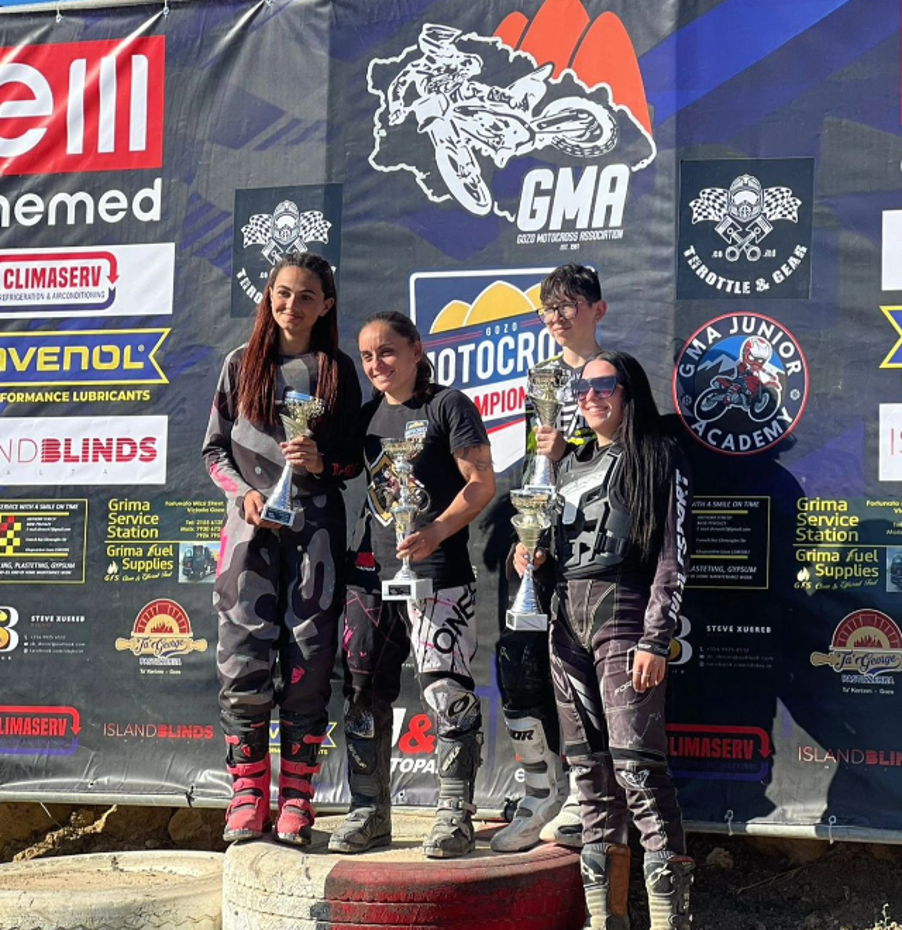
ES: This concept of specialization against doing different sport is an ongoing debate. How do you balance the sports?
EX: As I said, the priority is football. However, I’m active in CrossFit. The benefit is that I am a qualified coach in CrossFit and also a physio. So, putting that knowledge together means that I am aware of what my body can take. I limit myself a lot in CrossFit. For example when I’m training with the national team, CrossFit is almost non-existent or I may only focus on upper body. So, that awareness is very important.
ES: As someone who practices more sports, are there elements which stand out between the different sports in the support/structures, public’s perception and/or visibility?
EX: Yes, definitely. For example, when I mention Motocross there’s always this reaction that you can get hurt. It’s a sport and a skill, so you have to train for it. It’s not a matter of just getting on the bike and going, it’s very physically draining so you must be trained accordingly.
Similarly, with CrossFit you must know what you are doing. It’s about being able to combine different people at different levels and having them finish this at the same time. So, there is a negative perception at times that you get hurt. I think these recurring injuries in CrossFit happen when one does not know their limit.
In terms of visibility yes, I think there’s more to be done to cover certain sports. There’s a lot of sports, so I understand the challenges. In terms of football, there’s more coverage I feel than of other sports. Maybe a little less for women’s football, but I feel that’s improving because you can watch more games for sure (globally at least).
However, in Malta we have a lot of really good athletes who are giving the country a brilliant name abroad but they do not get that same recognition. Currently, I have some friends competing in Italy and they are in first place, they’re never covered. My family is heavily involved in Motocross in Gozo, so my mum writes the articles because she’s involved. However, there’s more that can be done from a wider media point of view. With regards to CrossFit there’s no one covering this either.
Recently the basketball teams, both men and women, did well and they did get some coverage, which is positive. However, yes I would say there’s definitely more that can be done to give all athletes recognition for their accomplishments.
Quick-Fire Questions:
- Score or Assist – Before I would say score, now I say assist
- Play at night or during the day – During the day
- Favourite football player – Lucy Bronze
- Favourite football coach – Sarina Wiegman
- A place you would suggest visiting from the ones you’ve played in – Spain, Israel and Denmark
- A sport you would like to try out that you’ve never done – Tennis or maybe Athletics
- More strength or more speed – More speed
- Dream stadium to play in – Camp Nou
- Dream team to compete against – Spain
- Main objectives for 2024/25 season – Win the league and personally be physically fit to play high intensity matches
Emma Xuereb forms part of the Maltese contingent that will be playing the final match in the UEFA EURO Qualification group stage matches against Portugal, tomorrow 16th July, at 19:00 CET at the Municipal Stadium of Leiria.
Check out more interviews from the Spotlight series by clicking here.
Lead Image: Dorienne Grech
Stay up to date by following The Sporting Fan on social media: Instagram ~ Facebook ~ X
